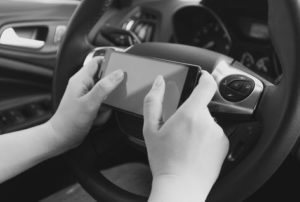
Distracted driving is a major concern for every state across the nation. More than eight people are killed and over one thousand are injured in collisions caused by distracted driving every day. In fact, 18% of all fatal car crashes in the United States are caused by distracted drivers. In 2014, 3,719 people died and 431,000 more were injured in distracted driving-related accidents. Floridians in particular suffer because of distracted driving. The Florida DMV noted in 2013 that distracted driving is the number one cause of auto accidents, with over 2,000 distracted driving accidents in 2011. In Marion County in 2015, 465 people were injured and 9 killed in distracted driving accidents.
In response to this crisis, many states have adopted laws banning certain activities while driving. In addition to banning texting while driving, Florida’s Department of Transportation has adopted a Distracted Driving Awareness Month that defines distracted driving as any mental or physical activity that takes the driver’s focus off the task of driving. While the campaign aims to increase awareness and reduce driver multitasking on the road, there are no official laws in Florida banning any activities other than texting. Recently, the state of New Jersey proposed adding a more aggressive law to its books that would allow officers to ticket drivers for nearly any activity unrelated to driving.
New Jersey’s Proposal
Like most other states, New Jersey has already banned using cell phones or other handheld devices while driving, but does not specifically prohibit other types of activities. The new law would permit officers to ticket drivers for engaging in “any activity unrelated to the actual operation of a motor vehicle in a manner that interferes with the safe operation of the vehicle.” Drivers caught doing anything an officer believes led to their distraction would be fined between $200 and $400 for a first offense and up to $600 for a second offense. Subsequent violations carry higher penalties, including fines of up to $800, points on a driver’s license, and possible suspension of driving privileges.
Lawmakers Split on Supporting the New Bill
Many fear that this would penalize drivers for even drinking a coffee while driving, but the bill’s sponsor has tried to mollify such fears. Assemblyman John Wisniewski said that he introduced the bill simply to encourage drivers to refrain from distracted driving, and that it is intended to educate, rather than penalize, drivers. He also noted that although the media has heavily focused on the possibility of coffee as a punishable offense, the bill does not actually cite drinking coffee as a distraction and that he does not believe officers would ticket drivers for drinking a beverage while driving.
Other lawmakers are not so sure. Steve Carellas, Policy and Government Affairs Director for the National Motorists Association Chapter in New Jersey, believes the law is unnecessary, as such activities are already covered under statutes that allow officers to ticket drivers for unsafe, careless, or reckless driving. He also believes that the proposed law is too broad, allowing officers to punish drivers for what he calls an unavoidable level of multitasking. Changing the radio station, for example, is a common activity while driving that Carellas believes may be unlawful under the new bill. Whether the bill will pass remains to be seen, but given the dismal rates of distracted driving injuries and deaths, the bill serves as an important reminder that any distraction can lead to tragic consequences, and all drivers would do well to keep that in mind while behind the wheel.
Injured in an Accident?
If you have been injured in an auto accident caused by a distracted driver, let lawyer John Piccin at Piccin & Glynn help. He has handled hundreds of auto accident cases and is prepared to answer your questions, negotiate with insurance companies, and even make home or hospital visits to ensure you get the support you need. Call John at 352-558-8480 or contact us online today.

